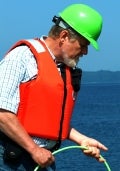When asked what he remembers best about his time at Waterloo, earth sciences graduate Brian Bornhold sums it all up in one word: muddy.
Waterloo was in a state of constant construction during my time as a student, Brian says with a laugh. But I really enjoyed the institution’s collegial and small atmosphere during the 60s.

Brian was looking to pursue a personal adventure in his post-secondary education, which he was able to do at Waterloo. Brian experienced an intimate learning environment and was one of only 4 students in his class. While his other classmates completed four-year degrees, Brian took a three-year degree and stayed on for an extra year of courses, making him the first graduate of the earth sciences program in 1967.
The small class size really contributed to the fantastic experience I had, Brian says. We received a lot of individual attention and one of our professors, Chris Barnes (who later became chair of the earth sciences department), would often take our class to quarries in Southwestern Ontario during the week, which was a great way to learn geology hands-on.
After graduating from Waterloo, Brian obtained his Master’s from Duke University and PhD from the Massachusetts Institute of Technology and the Woods Hole Oceanographic Institution. He completed his post-doctoral fellowship at the University of Toronto with Tuzo Wilson, a well-respected Canadian geophysicist.
Following a short teaching stint at the University of Toronto, Brian joined the Geological Survey of Canada (GSC) in Ottawa.
I worked in the high arctic looking at sediment transport and coastal processes and was later transferred to British Columbia at the newly established Institute of Ocean Sciences, which also houses a Fisheries and Oceans Canada lab, Brian says. I remained with the GSC for most of my career until I retired in 1998.
Even in post-retirement, Brian has remained busy. He is vice-president of Coastal and Ocean Resources, an environmental consulting company where he involved in geohazard and marine environmental mapping projects.
He is also president of International Tsunami Research, a virtual company specializing in numerical modelling of tsunamis and other oceanographic phenomena.
I focus on underwater landslides in coastal areas and what causes them to occur, he says. Some of the largest tsunamis we’ve ever had may have been caused by underwater landslides.
Brian also works as a project scientist at Project NEPTUNE Canada, based at the University of Victoria.
I help researchers determine what experiments should be carried out and assist with outreach to the research community, Brian says. Project NEPTUNE Canada is a multi-million dollar project that is really exciting for Canada.
Traditionally, ocean scientists have relied on infrequent ship cruises or space-based satellites to carry out their research. But Project NEPTUNE Canada changes this by building the world’s first regional-scale underwater ocean observatory that plugs directly into the Internet. People everywhere will be able to ‘surf the seafloor,’ and ocean scientists will be able to run deep-water experiments from labs and universities anywhere around the world.
Brian works with his former professor Chris Barnes, who is project director at Project NEPTUNE Canada and this isn’t the first time their paths have crossed. Brian also worked with him at GSC and Chris was also chair of earth and ocean sciences at the University of Victoria when Brian was an adjunct and part-time professor.
It has always been a pleasure working with Chris and it has been great to see our careers intertwine periodically over the years, Brian says.
While Brian graduated more than 40 years ago and now lives at the other end of the country, Waterloo is still a place he remembers fondly.
Waterloo definitely prepared me well for the future.